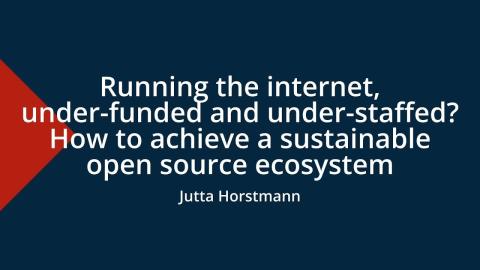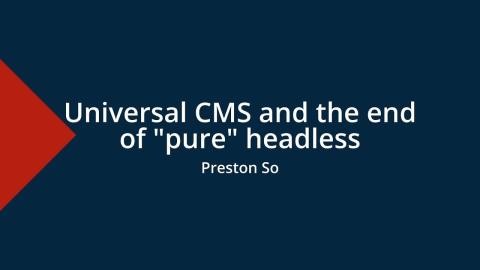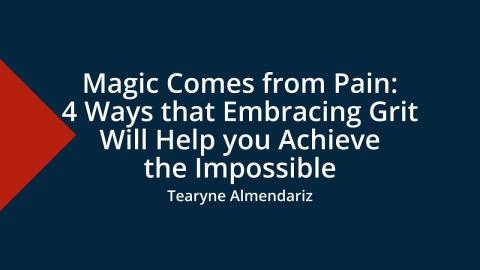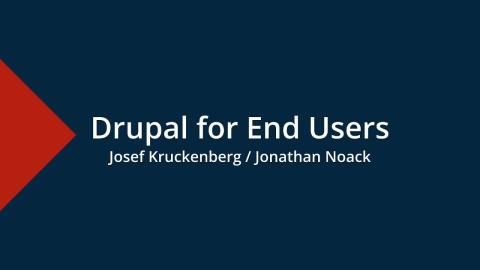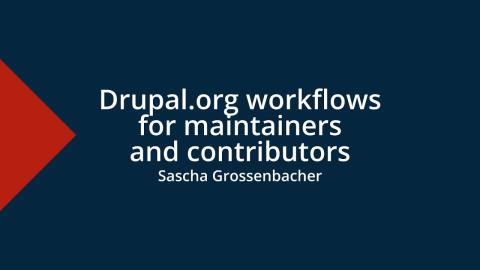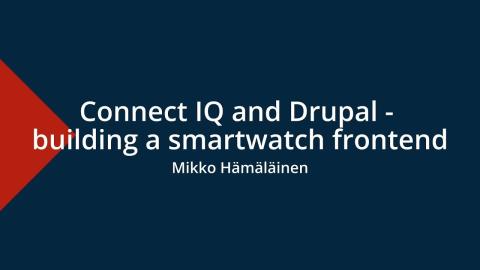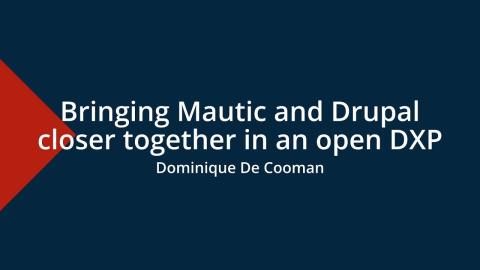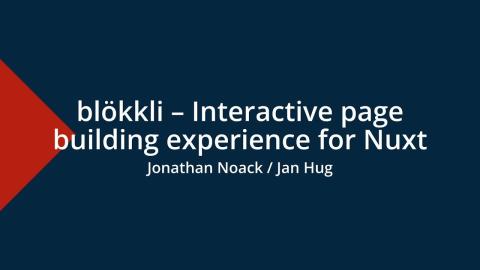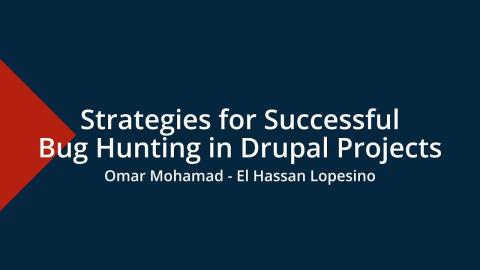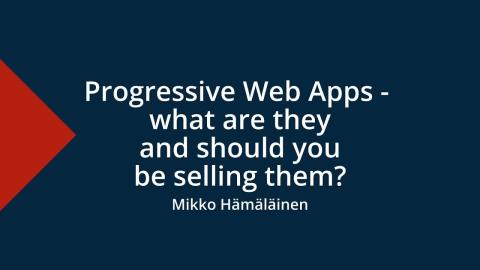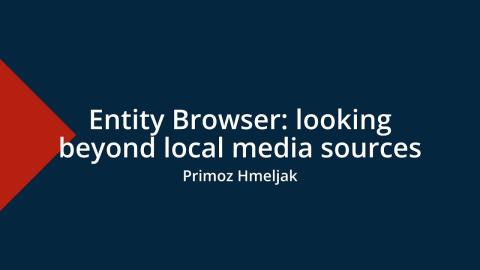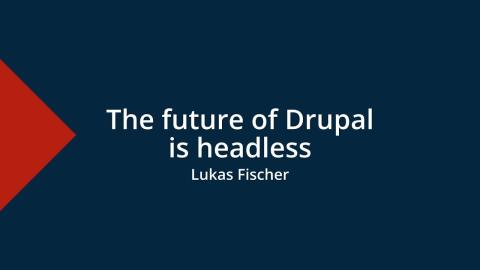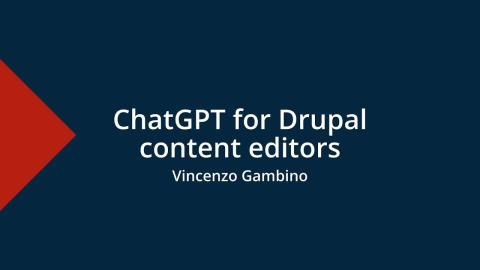Introduction
Videos from Drupal MountainCamp 2024.
Video Sponsor(s) / Provided by
Curated Videos
Description
Speaker: Jutta Horstmann
Open Source technologies build the foundation of the free and open internet, but many are developed by only a single maintainer or a very small community.
Despite the critical role these tools play in the internet ecosystem, they are perpetually under-funded and under-supported.
The similarity to other “system relevant” professions is striking: The more we need them to keep the system running, the less we are willing to appreciate and sufficiently fund them.
My keynote will discuss these issues as well as showcase funding solutions and business models to achieve economic sustainability for Free / Open Source projects.
This year we see the 10th anniversary of the disclosure of Heartbleed, an OpenSSL bug allowing for massive exploit of that key encryption library.
At the time of disclosure, some 17% (around half a million) of the Internet's secure web servers were believed to be vulnerable to the attack.
It allowed theft of the servers' private keys and users' session cookies and passwords,
making this the “worst vulnerability found since commercial traffic began to flow on the Internet” (Wikipedia).
When Heartbleed was discovered, OpenSSL was maintained by a handful of volunteers, only one of whom worked full-time.
Yearly donations to the OpenSSL project were about $2,000$.
In my talk, I will showcase the state of a couple of key and well-known Open Source technologies, exploring their staffing and funding situation.
We will revisit the improvements that happened since Heartbleed put a spotlight on the situation, including successful funding solutions and business models, but I will also share examples of a continuation of the problem, like the Log4j exploit in 2021.
The keynote is meant as a call to action for us as individuals, as a community, as well as a society, to care for Open Source software and those who write it - as one.of the key common goods our society ‘s infrastructure is built on.
Open Source technologies build the foundation of the free and open internet, but many are developed by only a single maintainer or a very small community.
Despite the critical role these tools play in the internet ecosystem, they are perpetually under-funded and under-supported.
The similarity to other “system relevant” professions is striking: The more we need them to keep the system running, the less we are willing to appreciate and sufficiently fund them.
My keynote will discuss these issues as well as showcase funding solutions and business models to achieve economic sustainability for Free / Open Source projects.
This year we see the 10th anniversary of the disclosure of Heartbleed, an OpenSSL bug allowing for massive exploit of that key encryption library.
At the time of disclosure, some 17% (around half a million) of the Internet's secure web servers were believed to be vulnerable to the attack.
It allowed theft of the servers' private keys and users' session cookies and passwords,
making this the “worst vulnerability found since commercial traffic began to flow on the Internet” (Wikipedia).
When Heartbleed was discovered, OpenSSL was maintained by a handful of volunteers, only one of whom worked full-time.
Yearly donations to the OpenSSL project were about $2,000$.
In my talk, I will showcase the state of a couple of key and well-known Open Source technologies, exploring their staffing and funding situation.
We will revisit the improvements that happened since Heartbleed put a spotlight on the situation, including successful funding solutions and business models, but I will also share examples of a continuation of the problem, like the Log4j exploit in 2021.
The keynote is meant as a call to action for us as individuals, as a community, as well as a society, to care for Open Source software and those who write it - as one.of the key common goods our society ‘s infrastructure is built on.
Description
Speaker: Preston So
The evolution of content management systems (CMS) has seen a shift from monolithic and hybrid-headless architectures to a new approach known as the universal CMS. In this talk, we'll look at the recent history of the headless CMS as a concept, how the headless CMS is no longer truly as "headless" as it seems, and why we need a new name for the emerging category of CMS that treats all presentation layers as first-class citizens, at the expense of no single persona.
While the headless CMS and decoupled architectures have continued to dominate the conversation in our industry, we can't overstate the remarkable staying power of monolithic and hybrid-headless architectures that remain popular. For many years now, advocates of so-called "composable architectures" have espoused the advantages of a more microservices-like and API-driven approach to CMS implementations. While this is essential for modern front-end development techniques and forward-looking conversational and immersive experiences, they still haven't achieved the new grand compromise I've argued our industry still needs. But there are signs that we're moving toward a more cohesive kind of CMS that honors its full-stack orientation, its newfound API capabilities, and its need to serve authors, marketers, and content creators in addition to developers: the universal content management system.
In the mid-2010s, we saw the advent of universal (or isomorphic) JavaScript architectures, which for the first time allowed JavaScript to be leveraged in novel ways across the stack. Today, we're seeing the same evolution in approaches in content management systems. Increasingly, key elements of CMSs that were formerly limited to traditionally monolithic implementations are now emerging up the stack in areas like routing, preview, layout management, and other CMS concerns. We're seeing the new grand compromise begin to take shape: a world in which there is absolutely no discernible difference between the headless front ends developers love to create and the monolithic front ends content teams love to control. The universal CMS portends a world where "publish everywhere" leaches into every aspect of content management—where the CMS is everything, everywhere, all at once: deployable anywhere, editable anywhere, renderable anywhere, and, as AI continues to gain steam, generable anywhere.
In this talk, we'll look at the recent history of the headless CMS as a concept, how the headless CMS is no longer truly as "headless" as it seems, and why we need a new name for the emerging category of CMS that treats all presentation layers as first-class citizens, at the expense of no single persona. Here's what we'll cover:
- A new grand compromise in CMS is finally emerging
- The problem of headless visual building and editing
- What makes a CMS truly universal?
- Deployable anywhere: The tech-agnostic, SDK-enabled CMS
- Editable anywhere: From editorial microinterfaces to headless page builders
- Renderable anywhere: Presenting content how its destination wants
- Generable anywhere: The AI-enabled universal CMS
- Epilogue: Open source, ethical AI, and the software field
The evolution of content management systems (CMS) has seen a shift from monolithic and hybrid-headless architectures to a new approach known as the universal CMS. In this talk, we'll look at the recent history of the headless CMS as a concept, how the headless CMS is no longer truly as "headless" as it seems, and why we need a new name for the emerging category of CMS that treats all presentation layers as first-class citizens, at the expense of no single persona.
While the headless CMS and decoupled architectures have continued to dominate the conversation in our industry, we can't overstate the remarkable staying power of monolithic and hybrid-headless architectures that remain popular. For many years now, advocates of so-called "composable architectures" have espoused the advantages of a more microservices-like and API-driven approach to CMS implementations. While this is essential for modern front-end development techniques and forward-looking conversational and immersive experiences, they still haven't achieved the new grand compromise I've argued our industry still needs. But there are signs that we're moving toward a more cohesive kind of CMS that honors its full-stack orientation, its newfound API capabilities, and its need to serve authors, marketers, and content creators in addition to developers: the universal content management system.
In the mid-2010s, we saw the advent of universal (or isomorphic) JavaScript architectures, which for the first time allowed JavaScript to be leveraged in novel ways across the stack. Today, we're seeing the same evolution in approaches in content management systems. Increasingly, key elements of CMSs that were formerly limited to traditionally monolithic implementations are now emerging up the stack in areas like routing, preview, layout management, and other CMS concerns. We're seeing the new grand compromise begin to take shape: a world in which there is absolutely no discernible difference between the headless front ends developers love to create and the monolithic front ends content teams love to control. The universal CMS portends a world where "publish everywhere" leaches into every aspect of content management—where the CMS is everything, everywhere, all at once: deployable anywhere, editable anywhere, renderable anywhere, and, as AI continues to gain steam, generable anywhere.
In this talk, we'll look at the recent history of the headless CMS as a concept, how the headless CMS is no longer truly as "headless" as it seems, and why we need a new name for the emerging category of CMS that treats all presentation layers as first-class citizens, at the expense of no single persona. Here's what we'll cover:
- A new grand compromise in CMS is finally emerging
- The problem of headless visual building and editing
- What makes a CMS truly universal?
- Deployable anywhere: The tech-agnostic, SDK-enabled CMS
- Editable anywhere: From editorial microinterfaces to headless page builders
- Renderable anywhere: Presenting content how its destination wants
- Generable anywhere: The AI-enabled universal CMS
- Epilogue: Open source, ethical AI, and the software field
Description
Speaker: Tearyne Almendariz
Inspired by SyFy's The Magicians and informed by works like "Grit" by Angela Duckworth and "So Good They Can't Ignore you" by Cal Newport, this talk will help attendees will learn four ways that they can embrace the principle of grit to achieve their goals.
Life as a worker in high-tech knowledge economy jobs can be difficult, even painful. Everything about the world we work in always changing. Many tasks seem impossible, even Herculean in their difficulty levels… and people still expect you to work magic and stick the perfect landing. The world keeps turning, and it's tough to keep up. You can do it, and while it may be difficult, the ways to do it are meaningful and achievable.
Inspired by SyFy's The Magicians and informed by works like "Grit" by Angela Duckworth and "So Good They Can't Ignore you" by Cal Newport, this talk will help attendees will learn four ways that they can embrace the principle of grit to achieve their goals. Tearyne will show you how you can master your inner magical strength and achieve your goals through perseverance - while preserving your peace of mind.
Inspired by SyFy's The Magicians and informed by works like "Grit" by Angela Duckworth and "So Good They Can't Ignore you" by Cal Newport, this talk will help attendees will learn four ways that they can embrace the principle of grit to achieve their goals.
Life as a worker in high-tech knowledge economy jobs can be difficult, even painful. Everything about the world we work in always changing. Many tasks seem impossible, even Herculean in their difficulty levels… and people still expect you to work magic and stick the perfect landing. The world keeps turning, and it's tough to keep up. You can do it, and while it may be difficult, the ways to do it are meaningful and achievable.
Inspired by SyFy's The Magicians and informed by works like "Grit" by Angela Duckworth and "So Good They Can't Ignore you" by Cal Newport, this talk will help attendees will learn four ways that they can embrace the principle of grit to achieve their goals. Tearyne will show you how you can master your inner magical strength and achieve your goals through perseverance - while preserving your peace of mind.
Description
Speakers: Josef Kruckenberg, Jonathan Noack
Editors will learn basics and advanced concepts of creating appealing content and landing pages with Drupal
- Learn the building blocks of a Drupal information architecture (Blocks, Nodes, Paragraphs, Layout Builder)
- Experience building landing pages in Drupal
- Learn the pros and cons of different editing approaches
Slides
https://docs.google.com/presentation/d/1fQ0HG2g5G9zJFV0JSFJatW6HLjcn9Gq_XLeT5FqDOP4/edit?usp=drivesdk
This session is for editors that know the basics of the web such as WYSIWYG editing and are keen to learn how page building in Drupal works.
At the end of the workshop you should be able to navigate the Drupal backend easily and have created your own visual landing pages. You will also have understood how different layout solutions in Drupal in headless setups may work.
Editors will learn basics and advanced concepts of creating appealing content and landing pages with Drupal
- Learn the building blocks of a Drupal information architecture (Blocks, Nodes, Paragraphs, Layout Builder)
- Experience building landing pages in Drupal
- Learn the pros and cons of different editing approaches
Slides
https://docs.google.com/presentation/d/1fQ0HG2g5G9zJFV0JSFJatW6HLjcn9Gq_XLeT5FqDOP4/edit?usp=drivesdk
This session is for editors that know the basics of the web such as WYSIWYG editing and are keen to learn how page building in Drupal works.
At the end of the workshop you should be able to navigate the Drupal backend easily and have created your own visual landing pages. You will also have understood how different layout solutions in Drupal in headless setups may work.
Description
Speaker: Sascha Grossenbacher
Issue queue processes, automated testing with GitlabCI, release management and more useful information about working with drupal.org for both maintainers and contributors
Issue queue processes, automated testing with GitlabCI, release management and more useful information about working with drupal.org for both maintainers and contributors
Topics:
- Issue queue: Status, Tags, Workflows, Patches & Merge requests
- Automated tests with GitlabCI: How set up a basic workflow, test against different Drupal/PHP versions, extend with custom services and dependencies
- Releases: Recommendations for branches and tags, tools to create releases
- Outlook
Issue queue processes, automated testing with GitlabCI, release management and more useful information about working with drupal.org for both maintainers and contributors
Issue queue processes, automated testing with GitlabCI, release management and more useful information about working with drupal.org for both maintainers and contributors
Topics:
- Issue queue: Status, Tags, Workflows, Patches & Merge requests
- Automated tests with GitlabCI: How set up a basic workflow, test against different Drupal/PHP versions, extend with custom services and dependencies
- Releases: Recommendations for branches and tags, tools to create releases
- Outlook
Description
Speaker: Mikko Hämäläinen
Smart watches are great for tracking activities and providing quick information to the user. In my presentation I will introduce Garmin's Connect IQ platform and show how to create a simple smart watch application that uses Drupal as its back end.
Connect IQ is Garmin's open platform for building applications for their devices. These include smart watches, bicycle computers and GPS handhelds.
There are many ways these devices could be used in collecting and providing information such as building a dedicated app for a sport event, gamifying and encouraging children's activities or providing small bits of information that can be accessed quickly such as server loads, electricity prices or notifications of different events.
The CIQ platform makes it relatively simple to create applications that are able to use the device sensors and interact with the outside world using the device's internet connection. In my presentation I will explain the basics of the CIQ platform, the language it uses (Monkey C) and take the audience through the process of writing a small application that communicates with Drupal.
Smart watches are great for tracking activities and providing quick information to the user. In my presentation I will introduce Garmin's Connect IQ platform and show how to create a simple smart watch application that uses Drupal as its back end.
Connect IQ is Garmin's open platform for building applications for their devices. These include smart watches, bicycle computers and GPS handhelds.
There are many ways these devices could be used in collecting and providing information such as building a dedicated app for a sport event, gamifying and encouraging children's activities or providing small bits of information that can be accessed quickly such as server loads, electricity prices or notifications of different events.
The CIQ platform makes it relatively simple to create applications that are able to use the device sensors and interact with the outside world using the device's internet connection. In my presentation I will explain the basics of the CIQ platform, the language it uses (Monkey C) and take the audience through the process of writing a small application that communicates with Drupal.
Description
Speaker: Dominique De Cooman
This session is about how Drupal and Mautic can form the backbone of an open DXP. It's about how to bringing different worlds together: bringing communities together, developers and marketers together and markets together.
This session is about how Drupal and Mautic can form the backbone of an open DXP. It's about how to bringing different worlds together: bringing communities together, developers and marketers together and markets together.
It's about how we can create a vision where both the Mautic and Drupal community can leverage its unique strengths.
In this session you will learn how an open DXP creates more value for the end user than Drupal alone or Mautic alone. It will be a part business and part community session. You'll learn about communities working together, about marketers and developers coming together and about developers working on both Drupal and Mautic together.
This session is about how Drupal and Mautic can form the backbone of an open DXP. It's about how to bringing different worlds together: bringing communities together, developers and marketers together and markets together.
This session is about how Drupal and Mautic can form the backbone of an open DXP. It's about how to bringing different worlds together: bringing communities together, developers and marketers together and markets together.
It's about how we can create a vision where both the Mautic and Drupal community can leverage its unique strengths.
In this session you will learn how an open DXP creates more value for the end user than Drupal alone or Mautic alone. It will be a part business and part community session. You'll learn about communities working together, about marketers and developers coming together and about developers working on both Drupal and Mautic together.
Description
Speakers: Jonathan Noack, Jan Hug
Simple content pages or complex landing pages. Blokkli provides a solid modular framework to build your own editing experience - works with Drupal Paragraphs (and other backends).
- blökkli allows editing content in a visual interface with tools for copying, duplicating, editing and deleting blocks.
- It supports custom block designs with options for background color, alignment and size. The artboard tool allows precise layout.
- Content can be searched for and placed as blocks. Multilingual support and live previews are provided.
- Collaboration features include comments, shared block libraries, and potential integrations like ChatGPT actions.
- Mobile editing is supported. blökkli integrates well with Nuxt and has adapters for Drupal Paragraphs.
- The tool is aimed at simplifying page building, customization and teamwork through its visual interface and features. It has a focus on productivity and flexibility.
Simple content pages or complex landing pages. Blokkli provides a solid modular framework to build your own editing experience - works with Drupal Paragraphs (and other backends).
- blökkli allows editing content in a visual interface with tools for copying, duplicating, editing and deleting blocks.
- It supports custom block designs with options for background color, alignment and size. The artboard tool allows precise layout.
- Content can be searched for and placed as blocks. Multilingual support and live previews are provided.
- Collaboration features include comments, shared block libraries, and potential integrations like ChatGPT actions.
- Mobile editing is supported. blökkli integrates well with Nuxt and has adapters for Drupal Paragraphs.
- The tool is aimed at simplifying page building, customization and teamwork through its visual interface and features. It has a focus on productivity and flexibility.
Description
Speaker: Omar Mohamad - El Hassan Lopesino
Explore bug detection, diagnosis, and fixes in Drupal. Learn essential modules, debugging, and quality assurance for bug fixes in this session.
Addressing website bugs is critical to guarantee a successful user experience. It is a priority to solve them as fast as possible, as bugs can break sites and harm user interaction. Yet, bug fixes must be done beyond short-term solutions, they must ensure long-term stability. It is as important as the incorporation of test coverage that prevents them from happening again. This comprehensive approach to bug resolution is vital for maintaining a stable Drupal website.
Join this session for an in-depth exploration of bug hunting and fixing in Drupal, where we'll deep into:
- Methods for identifying bugs in your live Drupal site.
- Exploring Drupal modules that help trace and detect bugs.
- Debugging as a tool for efficient catching of errors.
- Bug fixing Tips
- Quality Assurance: Explore strategies for quality assurance to prevent the recurrence of bugs.
Explore bug detection, diagnosis, and fixes in Drupal. Learn essential modules, debugging, and quality assurance for bug fixes in this session.
Addressing website bugs is critical to guarantee a successful user experience. It is a priority to solve them as fast as possible, as bugs can break sites and harm user interaction. Yet, bug fixes must be done beyond short-term solutions, they must ensure long-term stability. It is as important as the incorporation of test coverage that prevents them from happening again. This comprehensive approach to bug resolution is vital for maintaining a stable Drupal website.
Join this session for an in-depth exploration of bug hunting and fixing in Drupal, where we'll deep into:
- Methods for identifying bugs in your live Drupal site.
- Exploring Drupal modules that help trace and detect bugs.
- Debugging as a tool for efficient catching of errors.
- Bug fixing Tips
- Quality Assurance: Explore strategies for quality assurance to prevent the recurrence of bugs.
Description
Speaker: Mikko Hämäläinen
Quick introduction to Progressive Web Applications and what they could bring for your projects and customers.
Progressive Web Applications are a new way of creating installable web-based mobile applications. They are quick to install and address some of the weaknesses of traditional native mobile applications while allowing some advanced features such as push notifications and offline use. This presentation explains what PWA's are and the tech's history, why they are a great match for some of your customers and what are the potential pitfalls. This is a high-level presentation aimed for project managers, business leaders, sales people and in general people new to PWA's.
Quick introduction to Progressive Web Applications and what they could bring for your projects and customers.
Progressive Web Applications are a new way of creating installable web-based mobile applications. They are quick to install and address some of the weaknesses of traditional native mobile applications while allowing some advanced features such as push notifications and offline use. This presentation explains what PWA's are and the tech's history, why they are a great match for some of your customers and what are the potential pitfalls. This is a high-level presentation aimed for project managers, business leaders, sales people and in general people new to PWA's.
Description
Speaker: Primoz Hmeljak
Explore the versatility of Entity Browser in integrating diverse media sources: Bynder's DAM system, Pexels' stock photography, and Font Awesome's icons.
In the ever-evolving landscape of web content management, Entity Browser remains a powerful tool at our disposal, enabling seamless integration with various remote media providers.
In this session, we will showcase 3 practical examples of the versatility that Entity Browser provides in integrating diverse media sources. We will do that by looking at: Bynder, a Digital Asset Management (DAM) system; Pexels, a provider of free stock photography; and Font Awesome, a popular icon toolkit.
We will provide insights into different requirements for the 3 providers, the technical nuances of the integrations, as well as demonstrate the functionality.
Explore the versatility of Entity Browser in integrating diverse media sources: Bynder's DAM system, Pexels' stock photography, and Font Awesome's icons.
In the ever-evolving landscape of web content management, Entity Browser remains a powerful tool at our disposal, enabling seamless integration with various remote media providers.
In this session, we will showcase 3 practical examples of the versatility that Entity Browser provides in integrating diverse media sources. We will do that by looking at: Bynder, a Digital Asset Management (DAM) system; Pexels, a provider of free stock photography; and Font Awesome, a popular icon toolkit.
We will provide insights into different requirements for the 3 providers, the technical nuances of the integrations, as well as demonstrate the functionality.
Description
Speaker: Lukas Fischer
In an era where headless, composable, and decoupled systems are gaining traction, this session delves into the evolving landscape of Content Management Systems (CMS), with a special focus on Drupal's role as a headless CMS. While new players like Strapi and Sanity emerge, and concepts like Jamstack and MACH redefine the field, Drupal stands out as a resilient and adaptable platform. We will explore how Drupal, often labeled as "monolithic" and "traditional," is actually at the forefront of headless CMS technology, debunking myths in Jamstack and MACH marketing, and highlighting Drupal's potential in crafting digital experiences for 2024 and beyond.
In this session, I embark on a journey through the dynamic world of CMS, where traditional and modern architectures intertwine. I start by discussing the misconceptions surrounding Drupal as a "monolithic" and "old-school" CMS, setting the stage for a deeper understanding of its capabilities and evolution.
I showcase how Drupal, with its advanced headless capabilities, is not just keeping pace with, but often leading, the CMS evolution. By leveraging its flexibility and modular design, Drupal emerges as a formidable choice for building contemporary digital experiences.
I offer practical insights into using Drupal as a headless CMS. Drawing from our experience at NETNODE with our SaaS product NodeHive Headless CMS, we provide concrete examples and best practices. Participants will learn the strengths of Drupal as a headless CMS, how it compares with other solutions, and how to evaluate headless CMS options effectively.
The session aims to equip attendees with a comprehensive understanding of the CMS landscape, the unique strengths of Drupal, and the tools to make informed decisions about CMS technologies in 2024 and beyond.
Key Takeaways:
- In-depth understanding of Drupal's role in the evolving CMS landscape.
- Insights into the misconceptions and realities of Jamstack, MACH, and traditional CMS platforms.
- Practical knowledge on leveraging Drupal as a headless CMS for modern digital experiences.
- Comparative analysis of different headless CMS solutions, focusing on their strengths and applications.
In an era where headless, composable, and decoupled systems are gaining traction, this session delves into the evolving landscape of Content Management Systems (CMS), with a special focus on Drupal's role as a headless CMS. While new players like Strapi and Sanity emerge, and concepts like Jamstack and MACH redefine the field, Drupal stands out as a resilient and adaptable platform. We will explore how Drupal, often labeled as "monolithic" and "traditional," is actually at the forefront of headless CMS technology, debunking myths in Jamstack and MACH marketing, and highlighting Drupal's potential in crafting digital experiences for 2024 and beyond.
In this session, I embark on a journey through the dynamic world of CMS, where traditional and modern architectures intertwine. I start by discussing the misconceptions surrounding Drupal as a "monolithic" and "old-school" CMS, setting the stage for a deeper understanding of its capabilities and evolution.
I showcase how Drupal, with its advanced headless capabilities, is not just keeping pace with, but often leading, the CMS evolution. By leveraging its flexibility and modular design, Drupal emerges as a formidable choice for building contemporary digital experiences.
I offer practical insights into using Drupal as a headless CMS. Drawing from our experience at NETNODE with our SaaS product NodeHive Headless CMS, we provide concrete examples and best practices. Participants will learn the strengths of Drupal as a headless CMS, how it compares with other solutions, and how to evaluate headless CMS options effectively.
The session aims to equip attendees with a comprehensive understanding of the CMS landscape, the unique strengths of Drupal, and the tools to make informed decisions about CMS technologies in 2024 and beyond.
Key Takeaways:
- In-depth understanding of Drupal's role in the evolving CMS landscape.
- Insights into the misconceptions and realities of Jamstack, MACH, and traditional CMS platforms.
- Practical knowledge on leveraging Drupal as a headless CMS for modern digital experiences.
- Comparative analysis of different headless CMS solutions, focusing on their strengths and applications.
Description
Speaker: Vincenzo Gambino
In this session, I propose an integration of Drupal and ChatGPT to enable new possibilities.
In this session, I propose an integration of Drupal and ChatGPT to enable new possibilities. I will demonstrate how to use the GPT model to generate text and complete tasks such as answering questions, summarising content, or generating new content. The integration could be done using the OpenAI API, which allows developers to access the GPT model and make API calls from within a Drupal module or theme.
Additionally, I will show how this generated text can be used in Drupal by displaying it on a custom page or block or by using it to generate meta tags or product descriptions.
This integration of Drupal and ChatGPT has the potential to revolutionise the way we interact with websites and web applications by providing a more natural and intuitive experience for users.
Learning Outcomes
- Understanding how ChatGPT works
- Integrate ChatGPT into Drupal
- Generate content and Meta tags
- Learn ChatGPT Prompt engineering
Prerequisites
- Basic understanding of Drupal module development and Content Editing.
Synopsis
In this session, I will show how to integrate a Drupal Application with ChatGPT to help content editors improve their content creation workflow.
In this session, I propose an integration of Drupal and ChatGPT to enable new possibilities.
In this session, I propose an integration of Drupal and ChatGPT to enable new possibilities. I will demonstrate how to use the GPT model to generate text and complete tasks such as answering questions, summarising content, or generating new content. The integration could be done using the OpenAI API, which allows developers to access the GPT model and make API calls from within a Drupal module or theme.
Additionally, I will show how this generated text can be used in Drupal by displaying it on a custom page or block or by using it to generate meta tags or product descriptions.
This integration of Drupal and ChatGPT has the potential to revolutionise the way we interact with websites and web applications by providing a more natural and intuitive experience for users.
Learning Outcomes
- Understanding how ChatGPT works
- Integrate ChatGPT into Drupal
- Generate content and Meta tags
- Learn ChatGPT Prompt engineering
Prerequisites
- Basic understanding of Drupal module development and Content Editing.
Synopsis
In this session, I will show how to integrate a Drupal Application with ChatGPT to help content editors improve their content creation workflow.
